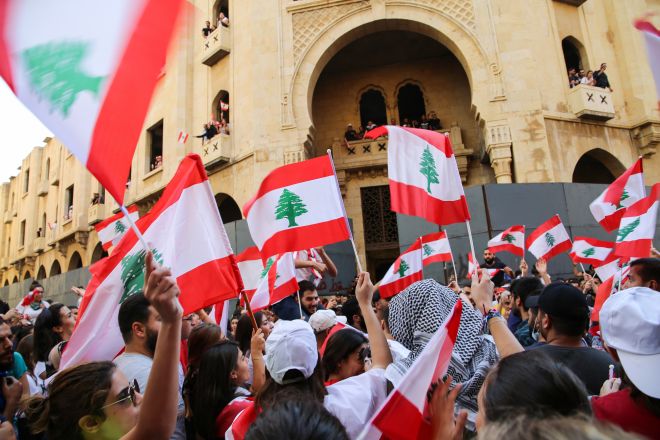Lebanon, the Forgotten Country
Published on March, 16 2021
Riad El Soleh-Beirut, Lebanon - October 19, 2019: Lebanese protesters against the current government, and against corruptions in the country. Photo credit: Hiba Al Kallas / Shutterstock.com.
By Nada Farhat
MEPAJC member, WILPF US Jane Adams Branch, and WILPF Lebanon Executive Member
March 2021
Lebanon’s location at the crossroads of the Mediterranean Sea and the Arabian landmass has shaped its rich history and diverse religious and ethnic culture. Lebanon’s geographic location has been both a blessing and a curse. The area has thrived with evidence of civilization more than 7,000 years predating recorded history. In more recent history, imperial powers have laid claim to its resources and access to trade routes.
On August 4, 2020, an explosion at Beirut’s port caused at least 204 deaths, 7,500 injuries, and $15 billion in property damage. The explosion left an estimated 300,000 people homeless. In a country with a population of 5.5 million, more than 1 million people live below the poverty line and the country is now hosting over 1.5 million refugees.
The Beirut Port explosion is not the only devastation in Lebanon: the political system has broken down and the country is in economic crisis. The government has a debt-to-GDP ratio that is the third highest globally. Unemployment reached 46% in 2018. Nothing can be accomplished when the country is politically sectarian, and each group is looking out for their own interests. Citizens have flooded the streets in protest. There is a countrywide condemnation of sectarian rule, the stagnated economy, unemployment, and political corruption. The government has failed to provide basic needs such as electricity, water, and sanitation.
WILPF Lebanon Speaks Webinar
On February 9, 2021, the Middle East Peace & Justice Action Committee of WILPF-US hosted four speakers from WILPF Lebanon to analyze Lebanon’s current situation and initiate a shared action plan for the two groups. In the webinar, WILPF Lebanon Speaks: Challenges and Hope, speakers Ferial Abu Hamdan, Hala Kilani, Diala Chehade, and Shirine Jurdi not only shed light on the current situation, they offered solutions.
According to the speakers, the Lebanese people themselves are adequately equipped both educationally and mentally to overcome the current crisis. They shared that the protesters on the streets of Lebanon are demanding democracy, denouncing the sectarian system, and asking for a change from the old system that is written according to the census of 1932. Politicians and militia leaders are holding on to this census because it is the only way their existence in the government continues to be guaranteed, since the demographics of Lebanon have shifted.
Diala Chehade specifically focused on Israel, explaining that all Lebanese parties condemn the crimes committed against the Palestinian people and support the cause of Palestine. She questioned the role of the United States in peacebuilding in the region, and said she believes the US can only redeem its role by acknowledging and supporting the International Criminal Court (ICC) in its role to hold Israel accountable for their treatment of the Palestinians.
With their presentations and the discussion that followed, the stage was set for an action plan. The webinar may be viewed on the WILPF US YouTube channel.
Working for a Comprehensive Middle East Peace Process
As Lebanon seeks to preserve its independence against the religious and political sects that keep forcing turmoil in the country, they are met with countless empty promises of outside help. After the blast, many countries came to aid in the initial devastation; however, continued support is vital with a country on the verge of civil war. All of this is taking place while religious sects continue to undermine the movement of civil society.
The hope is for a comprehensive Peace Process to develop in the Middle East as a whole. The people of Lebanon and neighboring countries deserve to live in peace and to have flourishing economies.
To that end, the WILPF US section is working to divest from the investments in weapons and arms as well as to “Move the Money” away from the military to social spending. We are also working on a Weapon of Mass Destruction Free Zone in the Middle East (see "Keep Pushing for WMDFZ in the Middle East").
After World War II, United States interests regarding Lebanon shifted to protecting oil interests and supporting the state of Israel. Lebanon will never be able to overcome Israel’s regime destruction while Israel has the full support of the US government.
The resilience of Lebanon’s people has been exemplified throughout the numerous wars the country has battled. After the 2006 war of Israel on Lebanon, internally displaced persons exhibited a high level of community resilience which resulted from this community’s economic and cultural factors and led to its ability to rebuild from the inside. (Nuwayhid, et al. 2011)
It’s time to call upon the US in its foreign policies to impose accountability on the corrupt government in Lebanon. This accountability will unveil the hidden agendas of the Lebanese politicians and their interest groups. With terrorist groups reigning supreme over the government, it has been left to the civilians to challenge the shortcomings of its corruption.
Lebanon is being overlooked internationally after the recent Beirut Port explosion, the government’s collapse, a struggling economy, and endless border troubles; it is time we stand for change.
References:
Lebanon Economic Monitor: The Deliberate Depression
Aljazeera.com: 'Deliberate depression': World Bank's dire warning on Lebanon
Nuwayhid, I., Zurayk, H., Yamout, R., Cortas, C.S. 2011."Summer 2006 War on Lebanon: A Lesson in Community Resilience." Global Public Health, 6 (5): 505-19.



